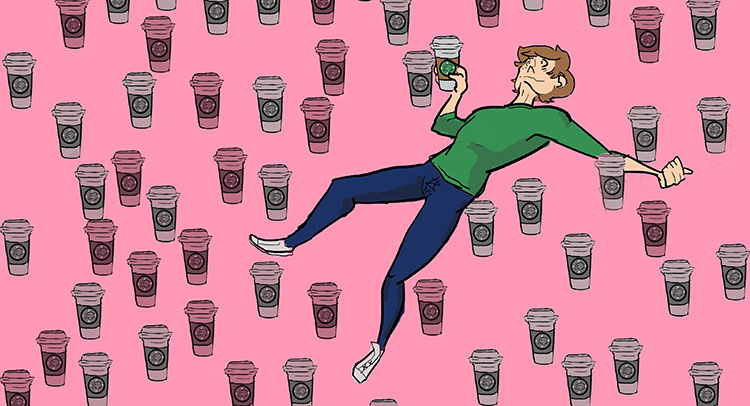Alcohol and amphetamines take a hard second to the most abused drug in America, caffeine.
Every morning, I hand some fratty-coffee-shop-dude my $1.88 in return for a cup of their Vanilla Nut roast so that I can start my day.
At least 68 million Americans drink three cups of coffee or more every day, according to Health Research Funding. Many feel as if they need their cup of brew to get a kick start to their work day.
Drinking products that are high in caffeine are helpful when a person needs to get up in the morning or do a paper late at night but it isn’t healthy to do continuously. The drinks that keep people up throughout the night can also give them increased blood pressure and a higher chance of muscle problems. Caffeine also affects the central nervous system. Symptoms of withdrawing off of caffeine include headaches, fatigue and irritability.
Quitting caffeine abruptly, especially if you’ve been consuming two or more cups of coffee a day, can cause physical, psychological, and emotional symptoms. In fact, caffeine intoxication and caffeine withdrawal are classified as mental disorders in the American Psychiatric Association’s Diagnostic and Statistical Manual of Mental Disorders (DSM) when either one interferes with daily life.
Like 54 percent of Americans over the age of 18, I drink coffee every day. It’s not necessarily just to stay awake, it’s also to fight the effects of caffeine addiction.
People can get addicted to caffeine by drinking coffee because caffeine is a drug. Students forget that they are filling their bodies with a central nervous system stimulant.
Coffee isn’t the only thing adding excessive caffeine to our bodies. Some of the lesser known culprits that are contributing to caffeine dependency are workout supplements and teas.
Soda, energy drinks and certain teas are driving students to caffeine overload as empty Monster cans and Starbucks cups fill trash cans across campus.
There’s nothing wrong with having a cup of coffee every once in awhile or even most mornings. Having over four cups a day or drinking excessive amounts of highly caffeinated drinks to stay awake is damaging to a person’s mental and physical health.
Although caffeine is great for 2 a.m. papers or for focusing in class it makes it more difficult for the mind to rest at night. Overuse actually prevents people from being able to focus. This is something to keep in mind when considering having that fourth cup of coffee.
While it’s almost impossible to think about getting through the day without using caffeine in some way, cutting down on the amount people drink is the best way to avoid caffeine dependency. Having life revolve around the first dose of caffeine in the morning can create a life of addiction.
Nicole Henson can be reached at [email protected] or @TheOrion_News on Twitter.









